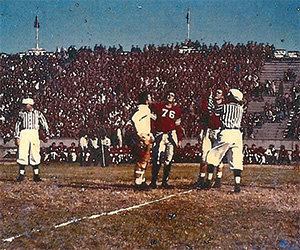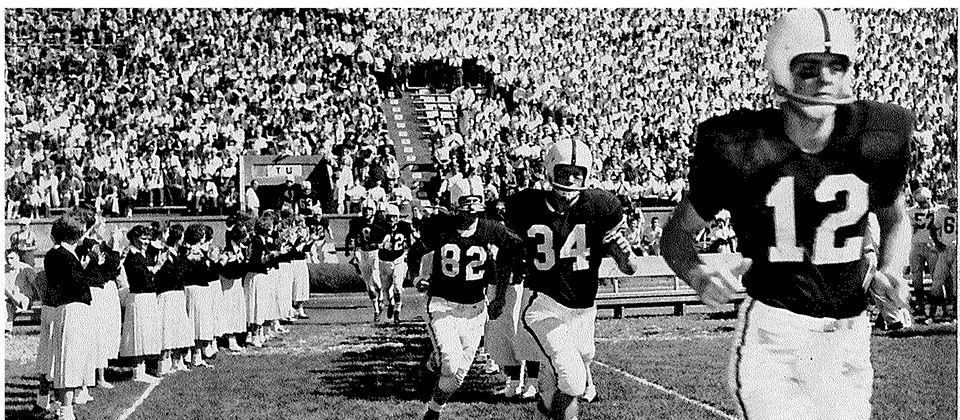Athlete Memories
I was a member of the 1957 freshman football team. We played Nebraska in Memorial
Stadium and Kansas in Lawrence that season. I left school in December 1957 to enlist
in the United States Navy, returning to school in January 1961. My wife Jill, who
is English, enjoyed her first “American football” game in Memorial Stadium in 1961.
We had a good friend who was on the varsity football team, 1961-64, who lived in the
stadium dorm. My mother’s first husband, George Wingate, is one to the honorees listed
on the Memorial Stadium plaque. He was killed in France in 1918.
James Weixelman ’64, ’68
Wamego, Kansas
It was 1963, the year President Kennedy was shot. Our football team, of which I was
a member, was not highly successful. We had won a game or two that fall, and had high
hopes of beating Oklahoma State. On our way to the game, the announcement came on
that the president had been shot. The game was cancelled. [In 1964], in Memorial Stadium,
we were tied 0 to 0 against KU until the last quarter when Gale Sayers, the famous
running back from KU, broke loose for a touchdown. Those were the lean years!
Max Martin ’67
Clay Center, Kansas
Playing rugby in Memorial Stadium back in the 1980s when it was still grass — it was
one of the coolest rugby venues I had the opportunity to play in as a collegiate player
and it still is. Many teams enjoy coming to play rugby at K-State’s “Old Stadium”
and partaking in its atmosphere. Many hard-fought rugby battles have taken place on
its turf. I still get to enjoy it as I travel one and a half hours one-way to help
coach and serve as team doctor for the current K-State rugby team. I also have two
sons currently playing with K-State.
Dr. Darrel Loder ’90
Marquette, Kansas
I ran on the “cinder” track for four years graduating in 1953. It was filled with
a lot of rocks, and when you stepped on them with your spikes, it could turn your
ankle — which many of us did. Coach had us form a line across the track once a week
and go completely around picking up the rocks in front of us. We ran under the East
Stadium on cold or snowy days. We dodged water holes and snow under there that the
trucks dropped when they delivered food to the training table for athletes. No complaints,
KSU Coach Ward Haylett Sr. (one track coach for all events) and track were good to
me. Wish I could do it all over again, and I would dodge more rocks.
Thane Baker ’53
Bellevue, Nebraska
Winner of the gold medal in the 4x100 m relay at the 1956 Summer Olympics in Melbourne,
Australia
I arrived in Manhattan, in the fall of 1959, to represent K-State in cross country
and track and field. At that time, my dad and I were the first family to be coached
by Ward Haylett Sr. during his tenure. I won’t forget eating at the training table
under the East Stadium where some athletes lived. The diet was mainly geared toward
the football players then. Besides being an accomplished miler in the 1930s, my father,
Dean McNeal ’34, was a member of the K-State football team. Back then, players could
play both ways and he was a wide receiver on offense and a guard on defense. Hard
to believe that he weighed only 175 pounds when he competed. K-State was a member
of the Big Six then. Many good memories of teammates and miles we logged in Memorial
Stadium.
Patrick McNeal ’64
Fort Worth, Texas
Being in a fraternity, having to go to Pant the Chant practices with your Homecoming
grouping in Memorial Stadium as a pledge, and then in years later to critique the
pledges doing it, is a good memory. It was always interesting since there were always
multiple groups practicing at the same time, which led to a lot of noise, confusion
and occasionally pranks. Playing on the club lacrosse team in the stadium leaves a
lot of good memories, but the best is an overtime win against KU during a cold nighttime
rainstorm. During practices in the evenings, you could, a lot of times, hear Aggieville
and smell the food, unless the winds were out of the north, and then you smelled the
cattle.
Braden Turner ’14
Farmington Hills, Michigan
I believe I may be the last person to do a live sports broadcast from Memorial Stadium.
I was actively involved with the KSU Soccer team that played in the stadium. One of
my roommates, Perry Seaton ’72, was a journalism major and very involved with the
student FM radio station. He organized for me to live broadcast a few games on that
station that could be heard in and around the Manhattan area. I do recall at one of
the in-stadium broadcasts asking for a moment of silence for folks from Wichita State
who had been killed in an airplane crash that weekend
Jim Killacky ’71, ’73
Greensboro, North Carolina
 When I arrived at Kansas State to study veterinary medicine, this was my first visit
to Manhattan. There were 73 in my class – all in Army uniforms and we marched early
morning and late evening. Marched all over campus and on the football field. Little
did I think then that later I would be playing football on this field. Many times
in the winter of 1943 and 1944, snow covered the football field and the seats in the
stadium, which made marching a great exercise. The seats in the stadium were all hard
cement. If you had guests for the game you furnished a pillow and a blanket.
When I arrived at Kansas State to study veterinary medicine, this was my first visit
to Manhattan. There were 73 in my class – all in Army uniforms and we marched early
morning and late evening. Marched all over campus and on the football field. Little
did I think then that later I would be playing football on this field. Many times
in the winter of 1943 and 1944, snow covered the football field and the seats in the
stadium, which made marching a great exercise. The seats in the stadium were all hard
cement. If you had guests for the game you furnished a pillow and a blanket.
Dr. Russell W. Hardin ’46
Boynton Beach, Florida

